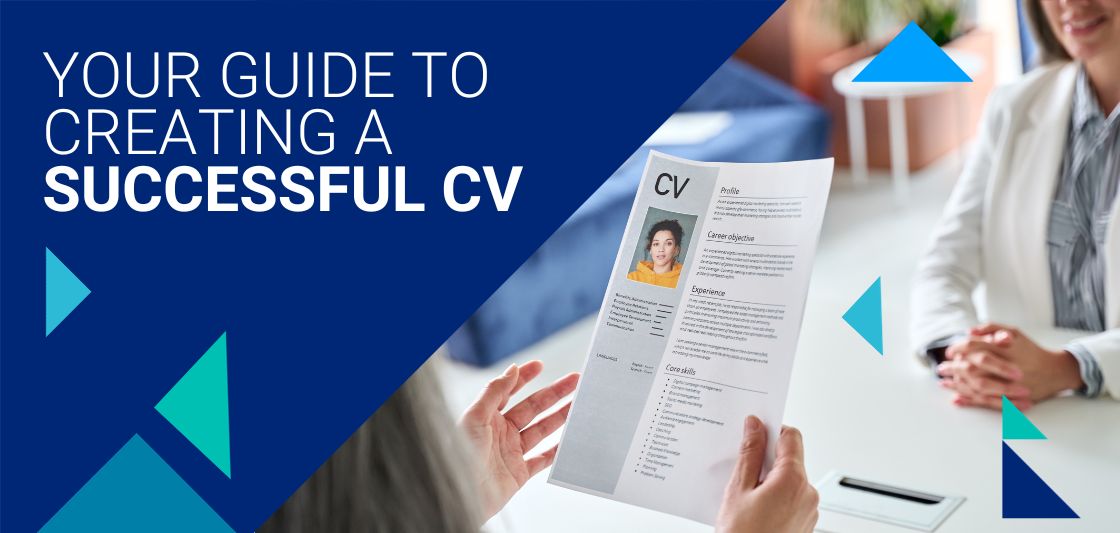Your guide to write a CV

Discover the best CV writing tips with our guide
CV writing can be a daunting prospect when starting your job search. This, along with your cover letter, is what a potential employer uses to make their first judgement about you.
To make the interview shortlist, your CV must demonstrate that you possess most or all the criteria required in the job. Tailor your CV for each position you apply for by expanding on your experience relevant to the job and cutting back the less relevant parts.
Your CV must also get past any initial screening algorithms, or applicant tracking systems (ATS), which identify suitable candidates based on the use of relevant keywords in their CV.
Tips for great CV writing
Contact details - Start with the basics such as your name, phone number, email address (make sure it’s a professional sounding one) and LinkedIn profile link.
Personal statement - In 50 to 150 words, describe your applicable experience. This summary should prove your value and help to differentiate you. Avoid describing what you’d like from your next job and instead focus on what you can offer. Use keywords from the job description so that an ATS can find a match.
Work experience - This should be listed in reverse order, beginning with the most recent. Include employer names, positions and primary responsibilities. If your job title is unconventional, it is perfectly acceptable to replace it with a recognisable equivalent. Quantify your accomplishments and remember to use verbs such as “managed” or “oversaw” to demonstrate your experience. Avoid overused clichés that can waste valuable space. Rather include examples of your work to demonstrate your strengths. Remember that proof is in your results.
We advise not to leave gaps in your work experience. If you took a year out, carried out an interim assignment, or travelled for six months, say so. Stating just the years you started or finished a role can also send off alarm bells. Writing "2018 - 2019" could be interpreted as employment from December 2018 to January 2019 unless you say otherwise.
Achievements - Then list your key career achievements, supported by facts, statistics or links. Keep in mind, this is a summary to grab interest by demonstrating you can successfully add value to an organisation.
Skills summary – List the systems, skills and competencies that are most relevant to the job you are applying for. Use keywords from the job description here too.
Education & qualifications – Keep it concise by listing the qualification obtained, year of completion, the institution’s name and a one-sentence summary.
References - Include details of two references, ideally former employers. If you are a graduate with no work history, include details of a former lecturer. The referees recruiters and employers value the most are those people you reported to directly who can speak about how you used your skills and experience to add value to their organisation.
Final checks - Don't forget to spell check your CV, it is the first impression your potential employer will have of you, so take the time to get it right. If possible, ask someone to check for any spelling, layout or typing errors.
Finally, attach or submit your CV and cover letter if requested. Unless otherwise stated, you don’t need to attach copies of certificates, qualifications or references. You should instead bring these to a job interview.
Follow our tips for updating your CV or download our CV template below.
Download your guide to write a successful CV
Please fill in the following information and the download will start automatically.
Tips for Job Searching
Tips to optimise a CV for algorithms
How to stand out from the crowd
Working with a recruitment consultant
Tips to Ace a Job Interview
Top tips for a successful interview
The word you are saying too much in interviews
Discussing your salary expectations
Answering competency-based interview questions
Answering behavioural job interview questions
Mastering Job Offers
How to deal with multiple job offers
How to deal with a counter offer
How to make a good impression on your first day
More Career Insights
Tips to build your personal brand and online profile
Future-proof your employability
Tips to adapt and develop your skills throughout career
Progressing Your Career

Looking for a new role? Find the latest jobs today or speak to Hays recruiter for career advice.

Salary check for professionals to negotiate your next pay review or plan your career progression.




